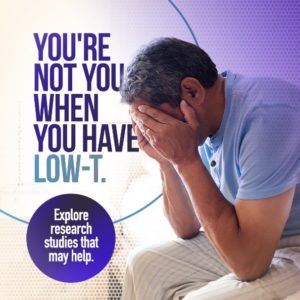Low testosterone or Low T is when the testosterone levels in the male body dip below where they should be. Aging is the most significant cause, though other conditions can cause it. Approximately 30% of men in their 50s will experience low testosterone. With each passing decade, the likelihood increases, growing to 50% by age 60 and 70% at 70. Despite its prevalence, many men are unaware they have it. Others are too embarrassed to talk about it. All the signs that point to having Low T may not be obvious, so it’s vital you know what to look for.
You’re not You.
Testosterone is a hormone that contributes to typical features of a male. It also serves functions vital to a man’s sexual health, bone strength, and muscle mass. Testosterone production begins to taper in all men late into their 40’s. For some, the levels continue to drop, causing a deficiency. Low T can cause various symptoms that are physical and emotional.
Signs of Low T:
- Drop in sex drive
- Fertility problems from low sperm count
- Physical changes of the testicles
- Difficulty concentrating
- Fatigue
- Weight gain focusing around the midsection
- Irritability
- Hair loss
- Depression
- Enlarged breasts
Weakening of the bones and loss of muscle mass are symptoms that occur over a more extended period. Together, they can leave men with Low T more susceptible to falls and injuries to the bones as a result. While this condition directly impacts mood and may cause depression, mental health issues can develop or worsen as an indirect byproduct of symptoms. These include potential relationship, social, and body image issues.

Lowered testosterone levels can also develop as a result of:
- Injury to the testes
- Response to specific medications
- Hormone disorders
- Chronic conditions
- Cancer treatments
- Low T Isn’t Uncommon and Can Safely be Treated.
Now that you know the most common signs, the next step is talking with your doctor. If your symptoms are due to an underlying condition, they can determine that and get it treated. Some men don’t require treatment and can help ease symptoms through natural methods like exercise and weight loss. Testosterone therapy and medications for specific symptoms are the most traditional treatment methods and provide improvement in most cases.

When our bodies go through changes during the aging process, we learn more about why conditions like Low T develop. We use what’s known to develop improved ways to detect, treat, and eventually prevent health issues. Clinical research studies and the volunteers who participate in them make these advancements possible. To learn more about enrolling Low T studies here at North Georgia Clinical Research, call (678) 494-5735, or visit our website.
References:
https://www.webmd.com/men/features/low-testosterone-how-to-talk-to-your-doctor
https://sunrisehospital.com/about/newsroom/living-with-low-testosterone-on-the-go
https://www.hormone.org/diseases-and-conditions/low-testosterone


